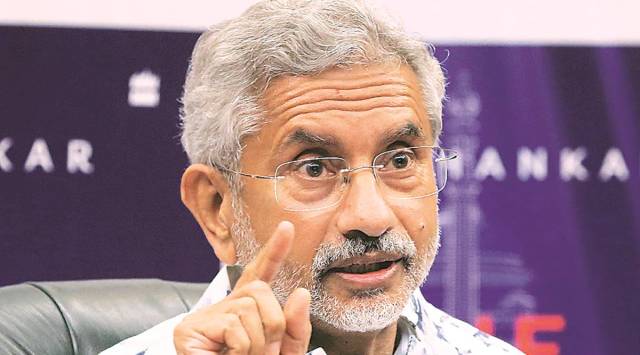DELIVERING HIS sharpest comments yet on China since the Moscow meeting last month with Chinese State Councillor and Foreign Minister Wang Yi, External Affairs Minister S Jaishankar Friday said the border stand-off in eastern Ladakh is a “very sharp departure” with a “very deep public” and “very major political” impact. Stressing that the Galwan incident on June 15, when 20 Indian soldiers and an unspecified number of Chinese soldiers were killed in violent clashes, has left the bilateral relationship “profoundly disturbed”, Jaishankar said the massing of troops at the border has created a “very critical security challenge”.
The Union Minister underlined that he has not got any “reasonable explanation” from his Chinese counterpart on China’s behaviour along the Line of Actual Control (LAC) in eastern Ladakh. Jaishankar also pointed to divergences with Beijing on “political issues” and “the relationship with Pakistan”. He said China has been “unsympathetic” to India on major trade issues like market access and “negative” on a “lot of international issues like the Nuclear Suppliers Group”.

Jaishankar, who is usually very calibrated in his remarks, made these comments in an hour-long discussion on his book, “The India Way: Strategies for an Uncertain World”, with former Australian Prime Minister Kevin Rudd, under the aegis of Asia Society. Rudd is the President of Asia Society Policy Institute, a think tank with offices in the US, Hong Kong and Australia among other places. The Minister’s comments reflect the sense of frustration in New Delhi over the lack of progress with China after seven rounds of military talks, six rounds of diplomatic talks, and at least three separate bilateral meetings at the level of NSA Ajit Doval, Defence Minister Rajnath Singh and Jaishankar with their Chinese counterparts over the last five months.
In response to questions by Rudd, Jaishankar was candid. “What happened this year, of course, was a very sharp departure. Now it’s not just a sharp departure from the conversation, it’s a sharp departure over a course of the relationship over 30 years…and the massing of a large amount of Chinese forces on the border was, you know, clearly contrary to all of this [agreements since 1993],” he said.
Read | China insists Indians vacate Chushul heights, India says clear Pangong north
“And when you had friction points, which was a large number of troops at different points, very close to each other… then something tragic, like what happened on the 15th of June, happened. And to underline the enormity of that, it was the first military casualty we had after 1975. So, it has obviously had a very deep public impact, very major political impact. And it has left the relationship profoundly disturbed,” he said.
Asked about the reason behind the massing of troops, Jaishankar said: “I haven’t frankly got any reasonable explanation from them on this matter. So, there are today [a] very large number of troops with weapons concentrated on that segment, the border, and that is obviously a very critical security challenge that we face.”
Story continues below this ad
Rudd said China’s activities — from the LAC to the South China Sea to Sino-Australian relationships — suggest that it is part of a “simultaneous pattern of Chinese policy assertiveness”. “It seems to make a central political point, Covid has weakened us and no one should assume that we’ve been weakened,” he said, referring to China’s viewpoint.
To this, Jaishankar said: “I am, if not agnostic, at least silent on this issue. But what I would say is, look, maybe what you say is true, maybe it’s not true, I mean let’s leave that aside.”
He said the two neighbouring countries built a relationship painstakingly, and have “issues of difference”. “I’m not suggesting to you that everything was wonderful. There were, you know, there were political issues of difference… there are issues on their relationship with Pakistan. There were major trade issues, the market access issues, they [are] unsympathetic to us, if not negative on a lot of international issues like Nuclear Suppliers Group, etc,” he said.
“So there are a whole set of issues. We’ve been engaging and talking to them over many years, including at the summit meetings…open discussions on each other’s interests,” Jaishankar said.
Story continues below this ad
Early September, Jaishankar and Wang adopted a five-point approach to resolve the crisis along the LAC and agreed that their troops “should continue their dialogue, quickly disengage, maintain proper distance and ease tensions”.
After the joint statement, the Corps Commanders met twice but there has been no progress towards disengagement, de-escalation and restoring status quo ante.
In the meantime, India has engaged with the Quad grouping at the Foreign Ministers’ level after which US Deputy Secretary of State Stephen E Biegun visited India and set the stage for the Indo-US 2+2 ministerial meeting likely on October 26 and 27.









